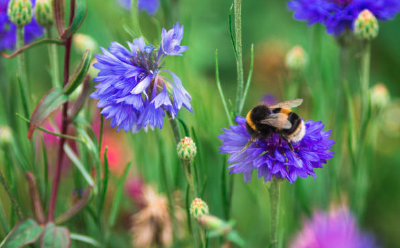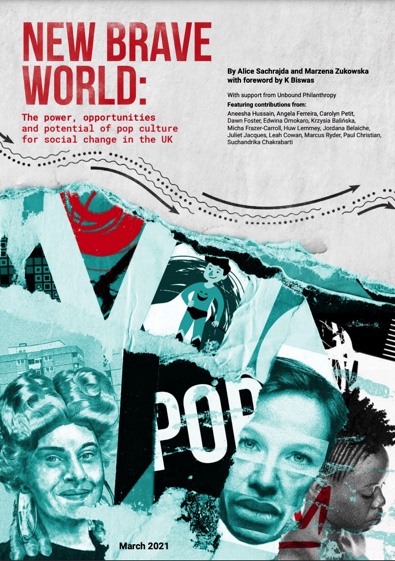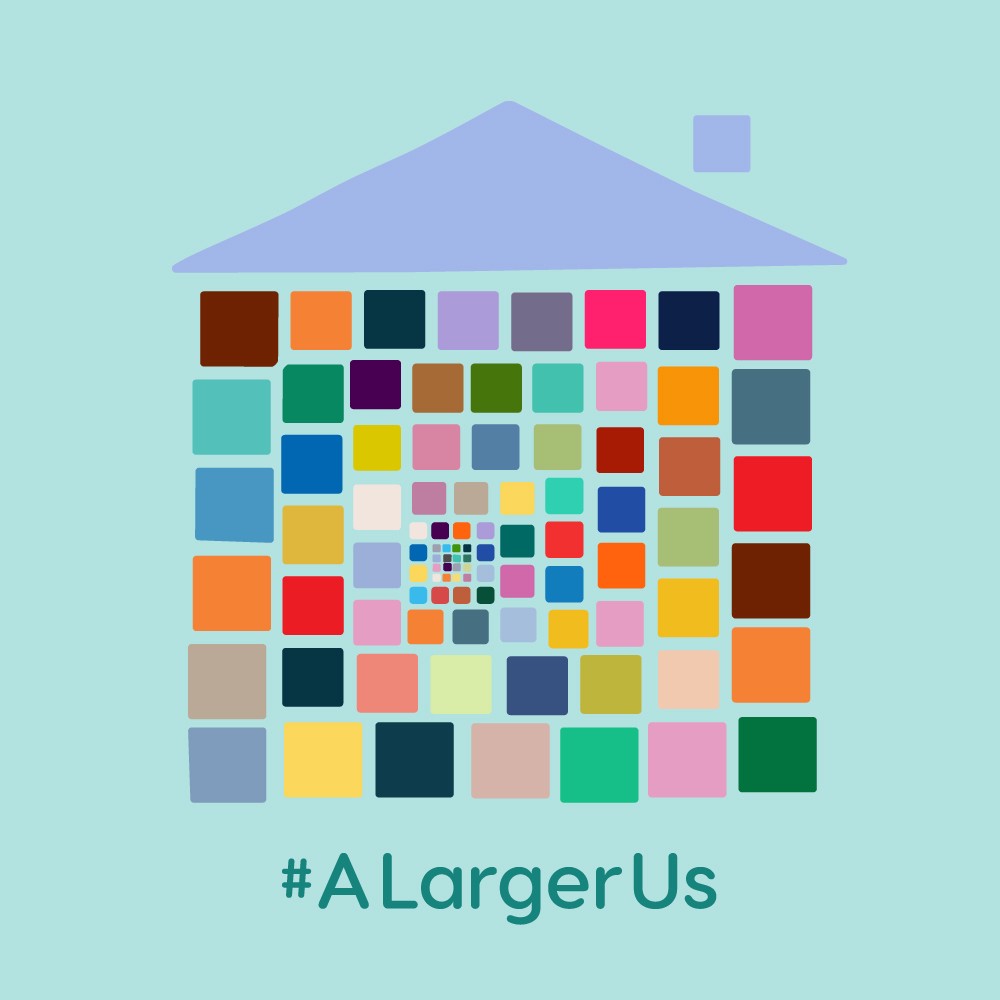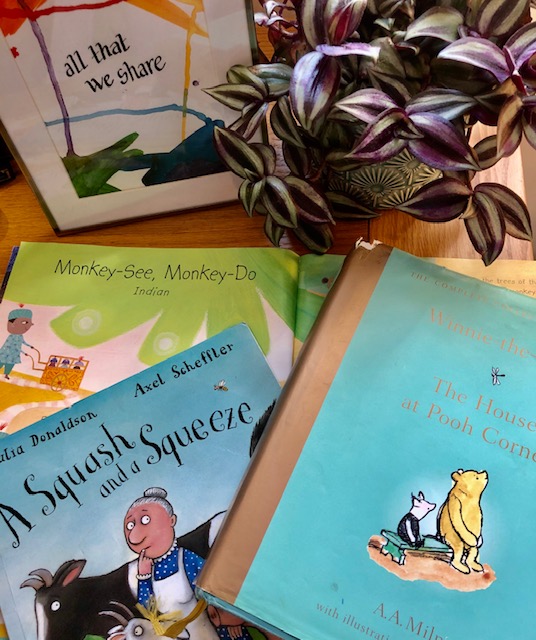
Image by Saskia Bueno for Fine Acts
Eight years ago, with much trepidation, I embarked on a career as an independent, freelance consultant. It was a daunting move – leaving the stability and security of a job at the Institute for Public Policy Research and stepping into the unknown. But, it was also an exciting opportunity for me to carve out a role doing exactly what I am passionate about (i.e. storytelling, creative research and strategic communications) and to explore new partnerships and opportunities. I learnt so much during this time – about myself, about the world of work and about how to collaborate with numerous different people and organisations.
Now, eight years on, I’m really excited to be taking up a new role as a member of staff at Unbound Philanthropy. I will be a UK Programme Officer leading Unbound’s UK’s work on climate migration and UK Head of Cultural Strategy. At last, I will have co-workers I can call my colleagues, a desk in an office and paid holiday! I’ll still have some capacity for consultancy, for the time being at Comic Relief where I’ve worked to set up the Power of Pop Fund. But the move into a more permanent position marks a big transition for me and I’m experiencing the quivering anticipation and reflection that comes with stepping into a new chapter in my life.
Over the years I’ve found myself dispensing advice about being freelance. Some people are curious about taking the plunge themselves and want to know more about how to make a success of it. Others have just begun a freelance career and are looking for guidance. So, this blog is a round up of my top tips and advice. Some of it is practical stuff, but it also contains advice about how to build up your profile and expertise as a freelancer. If you’re weighing up whether to go it alone, then I hope this will help to give you some reassurance and encouragement that it can be a hugely fulfilling and rewarding career choice.
Own your own space
It takes confidence to ‘go it alone’, particularly if you’re used to working in a workplace environment. I had the great joy and privilege to have the indomitable and irreplaceable Jess Search, former CEO of DocSociety, as my mentor. Her sudden, recent death has been painful to bear. But I’m pleased to be able to pass on the advice she shared with me, and it brings me comfort to know that her wisdom lives on:
- Jess encouraged me to own my own space. I still remember her repeating those words to me. It’s so easy for us to put ourselves down for what we can’t do, or struggle to achieve. But when you start to own your own space, something magic starts to happen: You grow in confidence and then you just keep getting better and better and it becomes self-fulfilling and infectious! It was important for me to keep reminding myself of this when I went freelance. A good consultant understands where their strengths lie and that is deeply appealing to a client.
- In order to know where your strengths are, there are numerous tests out there that can help to pinpoint your unique skills. Jess advised me to take the Myers Briggs Type Indicator Test and the Belbin Test. What a wonderful and validating experience to read about yourself in a way that celebrates your individual assets! I’ve recently taken the Four Seasons Profiling Questionnaire too. If you haven’t done these types of tests, they are well worth exploring.
- A simple tip if you need a bit more confidence in your work or communications is to use the 1-10 acting measure. You simply ask yourself: what number do I want to be today? 1 being the lowest confidence; 10 being the highest. Once you set that number, you have to act at that level. Once you realise that being confident is often to do with acting confident, and you can dial it up or down according to how you feel (and, perhaps most importantly, how you want to feel) you will regain a sense of control in your ability.
- Seek out a coach and a mentor. They are different and they will be able to help you in separate ways. I’ve experienced both and have found the guidance and support immeasurably helpful. In my experience a mentor will help to model their experience and inspire you based on their work and wisdom. A coach will expertly and intuitively support you to find your path and work towards your goals and objectives. These sorts of support can be extremely valuable for freelancers, particularly if you feel like you’re navigating unknown terrain. I had some coaching at the outset of going freelance and I’ve recently sought out a coach to work with me as I transition back into workplace employment.
When you understand where your strengths lie, you can be clearer with your clients about how you can support them to achieve their objectives. And quite frankly, you’ll be a whole lot happier because you’ll be less hung up about what you find difficult, and more excited about being the very best of you.
Get organised
There’s no doubt about it, if you want to be a successful freelancer you have to develop good habits around routine and develop strong organisational skills. No one is checking up on whether you’ve reached your performance management targets and if you don’t deliver for your clients to an excellent standard (and on time of course) then you will lose your reputation as a valued and trusted consultant. Here are some good places to start:
- I started out with a contacts spreadsheet setting out the names of people and organisations I would be interested to work with. I then methodically reached out to them and set up coffees and initial chats. This proactive approach really helped with spreading the word about my consultancy offer.
- I cannot stress enough how important it is to be crystal clear about your brief with your client. Vague briefs and lack of clarity around your deliverables can lead to miscommunication – on both sides. So, right from the start, ensure that you agree on the number of days, the specific types of outputs, the level of detail and the exact time-frame you will be working towards.
- Find ways to communicate your offering as a freelancer as succinctly as possible. I found it helpful at the outset to list out the sorts of areas I wanted to work on with clients. I set up my website so I could have a repository for my completed work with a blog to show clients where my interests and passions lie.
- I have a separate to-do list for each client and always have an additional running to-do list for: ‘communication and networking’, ‘finance and admin’ and ‘development – future work’. I used Evernote for a while and considered Asana. But now I’ve become a total convert to Google Keep – a great tool for listing tasks.
Connecting and networking
Networking doesn’t come easily to everyone, but it’s worth working at it as a freelancer. It’s very rare that a client will contact me out of the blue because they happened across my website and decided to get in touch with me about a piece of work. Instead, much of my work comes through word of mouth and the contacts I’ve made over the years.
- I enjoy networking and I absolutely love connecting people to one another! More about that here. I recommend using LinkedIn as a valuable tool for connecting with people working at organisations you are interested in. Do update your LinkedIn profile as it’s often the first place someone will look when they are finding out about your skills and experience as a consultant. I’ve made a point of asking former colleagues and clients to write a testimonial after completing a piece of work. If possible posted on LinkedIn, or I ask them to send it to me so I can add it to my website here.
- Attend events and meet people in person. Developing a rapport and a relationship with your clients is vital.
- If you’re nervous about networking then my biggest tip is just to ask questions – Where do you work? What do you enjoy about your job? What projects are you working on? Do you have to travel much? Etc. etc. People love talking about themselves!
- I’ve dispensed with all those paper business cards that were gathering dust in a drawer and now use ZenCard – a brilliantly clever and simple business card app that you can download and then you scan a QR card which contains all your contact info. Boom – you’re right there in someone’s phone to contact at a later date!
Invest in yourself and your work
Investing in yourself as a consultant is well worth it. Here are my tips for looking after yourself and investing in your work outputs:
- In a workplace your employer will make sure you have everything you need, but as freelancers we sometimes forget to look after ourselves. I found it was worthwhile setting up and paying for a website, investing in a good laptop and monitor, buying a Zoom licence, paying for an accountant (I use AIMS) etc. And don’t forget to set yourself up with a pension too – easy to overlook, but important.
- I’ve worked at a range of different work venues over the years – including the House of St Barnabas, the Royal Society of the Arts, the Southbank Centre Members area and the Tate Modern Members area. It was nice to have a change of scene and a quiet place to meet with clients or collaborators.
- I have a bookshelf absolutely heaving with non-fiction books and I’ve found that reading into the subjects I’m working on, and interested in, has enhanced my knowledge tremendously. It’s easy to view self-development as a luxury, but in fact I would describe it as a necessity. Read lots, attend webinars, write blogs, show up at events. This will increase your profile and lend to your credibility as an expert in your space.
- I have had a longstanding collaboration with the lovely, talented designers at 05 Creative and we’ve worked together on many projects over the years (see more here). I’ve often paid for their services out of my own consultancy fees, knowing that a polished, well designed slide share, report or visual tool will make my work shine in a way that I could never achieve by myself. I can also recommend Studio Scamps for a brilliant and thoughtful report illustration and design too.
- I often get asked about day rates. My advice is to ask other freelancers what they are charging for their time – most people will be only too happy to have a transparent conversation. In my experience women have a tendency to under-charge for their time. Remember your expertise and value is what your client is paying for and you’re worth it! Over the years I’ve also adjusted my day rate according to my client – i.e. higher for more established organisations, less for a smaller charity or organisation that I want to support in a semi pro-bono capacity; more for a one-off piece of work, less for a longer-standing piece of work that will bring me some security etc.
- Watch out for clients that try to get you to do work for free. It happens a lot – i.e. can you speak on a panel, speak at a meeting, write an article – ah but sorry, we don’t have a budget to pay you! I’ve got better at making sure I honour my time and charge for it.
Explore collaborations and partnerships
As freelancers, we can feel adrift from the comfort and stability of paid employment with the support and camaraderie that it brings. You don’t have anyone to manage; no one is managing you – there’s a freedom that comes from that, but it can also be something you might miss. This is what I’d recommend as a counterbalance:
- Freelance doesn’t always have to be a lonely endeavour. I’ve loved the collaborations I’ve worked on over the years. Shout out to Lena Baumgartner, Alex Glennie, Marzena Zukowska; Esme Peach, Phoebe Tickell, Ruth Taylor, Thomas Coombes, Selina Nwulu – I’ve learnt so much from working with you all over the years!
- One of my great joys during my years of being freelance was setting up and running Odyssey Stories with my co-founder, Alex Glennie. We were successful in applying for an Ideas and Pioneers grant from Paul Hamlyn Foundation. Our project launched in 2019 in Oval Tube station – sharing illustrations and stories from local people living and working in the area. Alex and I were delighted to recently pass on the running of Odyssey Stories over to the Social Change Agency and we’re excited to see Odyssey Stories take on a new life under their guidance.
- Consider becoming a trustee of a charity. I have the great honour and privilege to co-chair the board of trustees at Counterpoints Arts. It’s a true pleasure to be a part of the team and to work in partnership with the phenomenal staff team and board. The Chair-Director relationship is a deeply rewarding one too. As part of the team I’ve been invited to attend events and retreats, take part in training, chair events etc. So as much as you think you’re giving something, you’ll more than likely gain something yourself too. A chance to channel your inner Go Giver…
- Become a mentor yourself. I am part of the mentorship programme at Heard, which has a really thoughtful mentoring programme. It’s lovely to see my wonderful mentee progress and develop – she inspires me no end! And it’s a chance for me to give back and to share some of the things I’ve learned from over the years.
Freelancing isn’t for everyone. I’ve known friends who’ve gone freelance only to find that the unsteady ebb and flow of the work is too unsettling and have hot footed it back into regular, paid employment. Overall, I’ve enjoyed the stimulation of so much variety and the opportunity to explore what it’s like to work with many different types of organisations. It’s made me more discerning about who I’d choose to work for and I’ve experienced many different workplaces and leadership styles.
The final thing to remember is that context matters. There are times in your life when freelance consultancy might work better than others. For me, when my children were little and I was juggling school drop-offs and needed greater flexibility, freelancing was a wonderful option. Now that they are a bit older, I’m looking forward to the security and stability that a regular paid job will bring.
If you’re considering taking the plunge into freelance, then I hope this blog has been helpful for you. Above all, I urge you to own your own space – it will bring true working joy and enable you to be the very best you can be.








